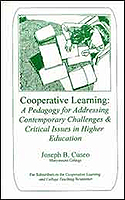Key Information
Cooperative Learning: A Pedagogy for Addressing Contemporary Challenges, By Joe Cuseo
1996 [ISBN: 0-913507-80-6; 56 pages; 5.5-by-8.5-inch] $6.96
 Joe Cuseo’s analysis of fourteen critical issues in higher education and how cooperative learning addresses those issues is a must for those interested in improved education. In his review, Joe draws from research and theory on a wide range of sources going well beyond the traditional cooperative- and collaborative-learning literature. Material drawn from communication theory, information processing, management theory, general education, training and development, feminist pedagogy and a host of other areas are brought to bear in addressing the critical concerns which serve as the focal points for Joe s analysis.
Joe Cuseo’s analysis of fourteen critical issues in higher education and how cooperative learning addresses those issues is a must for those interested in improved education. In his review, Joe draws from research and theory on a wide range of sources going well beyond the traditional cooperative- and collaborative-learning literature. Material drawn from communication theory, information processing, management theory, general education, training and development, feminist pedagogy and a host of other areas are brought to bear in addressing the critical concerns which serve as the focal points for Joe s analysis.
The Contents
A Note from Jim Cooper
Abstract
Introduction
- Promoting Active Student Involvement in the Learning Process
- Capitalizing on the Power of the Peer Group to Increase Academic Achievement via Peer Teaching and Learning
- Increasing Student Retention by Promoting Persistence to Course, Program, and/or Degree Completion
- Promoting Independent, Self-Directed Learning
- Realizing the Goals of Liberal Learning and General Education
- 6Promoting the Development of Critical Thinking Skills
- Enhancing the Development of Writing Skills
- Developing Oral Communication Skills
- Increasing Student Satisfaction with the Learning Experience and Promoting Positive Attitudes Toward Course Content
- Accommodating the Diverse Learning Styles of Today’s Students
- Promoting Student Retention and Academic Achievement in the Fields of Math, Science, and Technology
- Preparing Students for Citizenship
- Developing Students’ Leadership Skills
- Preparing College Graduates for the Contemporary Work World
The Author
Joe Cuseo, Ph. D., holds a doctoral degree in Educational Psychology and Assessment from the University of Iowa. Currently, he is Professor Emeritus of Psychology at Marymount College (California) where for more than 25 years he directed the first-year seminar, a course required of all new students. He is a columnist for a bimonthly newsletter published by the National Resource Center for The First-Year Experience & Students in Transition, and has received the Resource Center’s “outstanding first-year advocate award.” He is also a 14-time recipient of the “faculty member of the year award” on his home campus, a student-driven award based on effective teaching and academic advising.
He has delivered over 100 campus workshops and conference presentations, and authored numerous articles and chapters on faculty development, student retention, and the first-year experience, the most recent of which is a textbook for first-year seminars or student success courses, titled: Thriving in College and Beyond: Research-Based Strategies for Academic Success & Personal Development, and a textbook on diversity, titled: Diversity & the College Experience: Research-Based Strategies for Appreciating Human Differences. Current writing projects to be published in 2010 include: Thriving in the Community College & Beyond:Strategies for Academic Success and Personal Development; The First-Year Seminar: Research-Based Guidelines for Course Design, Delivery, & Assessment; and Humanity, Diversity, and the Liberal Arts: The Foundation of a College Education for summer reading programs.
